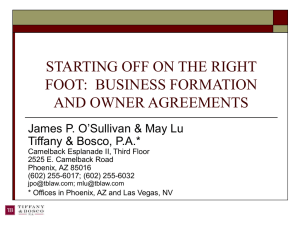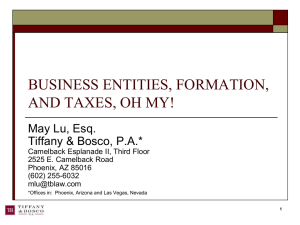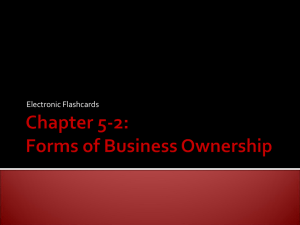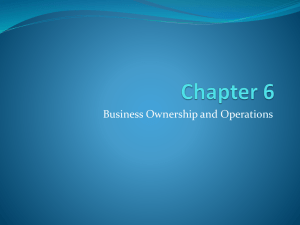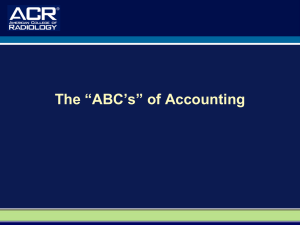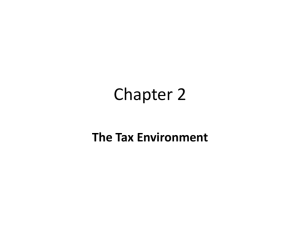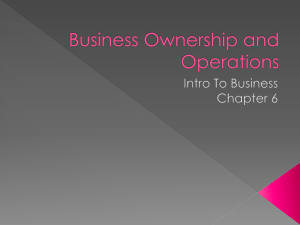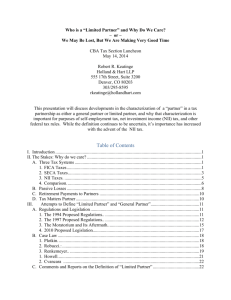Choice of Business Entity: Positives and Negatives
advertisement
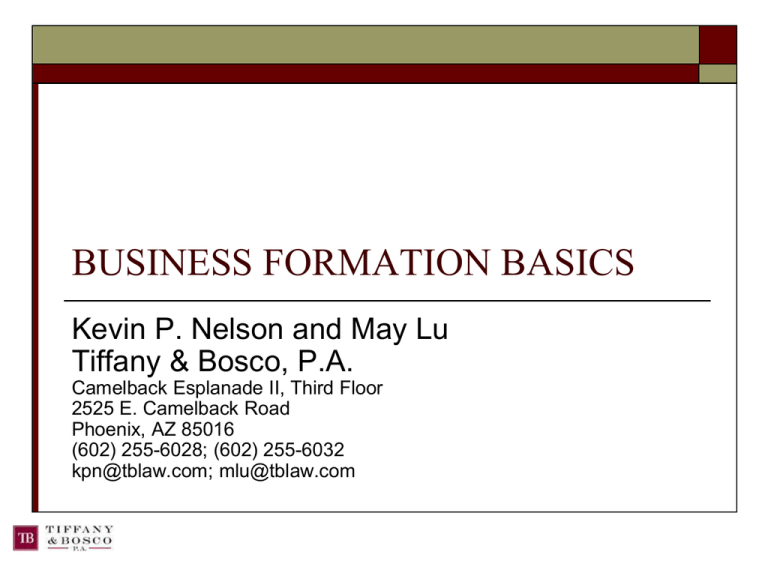
BUSINESS FORMATION BASICS Kevin P. Nelson and May Lu Tiffany & Bosco, P.A. Camelback Esplanade II, Third Floor 2525 E. Camelback Road Phoenix, AZ 85016 (602) 255-6028; (602) 255-6032 kpn@tblaw.com; mlu@tblaw.com Choice of Business Entity: Legal Forms (Pros and Cons) Disclaimer Information presented here is general information. Choice of the right entity for your specific situation depends on your fact situation and how the law and market conditions apply to that situation. Consult professional advisors such as your accountant, insurance professional and business attorney. Legal Forms a Business May Take Sole Proprietorship Partnerships General Partnership Limited Partnership Limited Liability Partnership Legal Forms a Business May Take Corporations ‘S’ Corporation ‘C’ Corporation Limited Liability Company Sole Proprietorship Sole Proprietorship Default for one person ‘owning’ their own business Simplest form Unlimited Personal Liability! May be ineligible for tax-free fringe benefits Sole Proprietorship Business not a “going concern,” nothing to sell at death or retirement Fictitious name filing No reason to use, considering allowance of one-member LLC in Arizona General Partnership An association of two or more persons to carry on as co-owners a business for profit. All parties are equally ‘involved’ All partnerships have the benefit of flowthrough taxation (i.e. entity does not pay tax itself, with some exceptions) General Partnership In a general partnership, all partners subject to personal liability! Should create a written partnership agreement, otherwise at-will and subject to default rules of state of formation Revised Uniform Partnership Act (RUPA) in Arizona Limited Partnership Still need at least one general partner Can be a corporation, another limited partnership, etc At least (1) partner more involved – general partner (unlimited liability) Control issues (use of name) Usually ‘money’ person and ‘manager’ Limited Partnership Some liability protection – still minimal Gives limited liability to the “passive investor” Only liable to extent of capital contribution Additional filing = additional cost Should create separate partnership agreement Self-employment taxes! (Income vs. Guaranteed Payments) Limited Liability Partnership If general partnership or limited partnership, easy and wise to switch to LLP Limited liability for all partners Generally, Limited Liability Company is the better entity form if you can afford to plan Limited Liability Partnership Why not LLP? Flexibility in Taxation Cannot be a partner of yourself Flexibility in management (binding partnership) and rights (partnership property) C Corporation Default whenever a corporation is created Taxed at corporate level – income, including dividend income, of shareholders is also taxed (Double Taxation!) But no Self-employment tax of distributions Corporate Formalities C Corporation Management structure fixed Shareholders; Board of Directors; Officers Deductible Benefits to Employees Can cut tax liability Losses incurred by C corporation do not flow through to owners Should form if plan to go public soon S Corporation Election of a C Corporation or Limited Liability Company Avoid Double Taxation – Flow-through Still some corporate tax: accumulated earnings tax No self-employment taxes on distributions Good for close corporations S Corporation Four relatively confining requirements Must be corporation of state or U.S. territory; partnerships and corporations cannot be shareholders (s/h); no more than 100 s/h; only citizens or residents of U.S. may be s/h; and only one class of stock (can have voting/nonvoting) Limited Liability Company Limited Liability – Even for one member Ability to Elect Federal Taxation as Corporation or Partnership Closest to Corporation Without Tax Attributes Very Flexible Organization Some Risk Because New Entity Form Self-employment Taxes Choice of Business Entity: Cost & Timeline In General Takes approximately nine (9) days to file Articles of Incorporation or Articles of Organization with the Arizona Corporation Commission on an expedited basis. $35.00 to expedite filings. Other states will vary Should seek advise of local professionals Check/Reserve Name ($10.00) Name appropriately Do not forget the Internal Revenue Service (EIN, S Election) C Corporation Articles of Incorporation ($60) Statutory Agent Certificate of Disclosure (Included) Organizational Meeting Minutes (Attorney) Bylaws (Attorney) Certificate of Good Standing ($10.00) C Corporation Filing: Tucson or Phoenix Keep Originals – Corporate Book (approx. $80 for leather, with certificates, etc.) Employer Identification Number Publication of Articles – local newspaper; 3 consecutive weeks (Cost Varies) Get affidavits from each newspaper – at least two originals from each Annual Filings ($45) S Corporation Very Similar to C Corporation Tax Election – Flow-through Taxation Make Sure to Meet All Requirements Partnership Default entity for two or more persons Partnership Agreement! RUPA – A.R.S. §§ 29-1001 et seq. CAVEAT “An association of two or more persons to carry on as co-owners a business for profit forms a partnership, whether or not the persons intended to form a partnership.” A.R.S. § 29-1012(A) Limited Partnership Certificate of Limited Partnership ($10 fee; $3.00 per page) File Certificate (Two signed copies) Partnership Agreement (Attorney/CPA) Limited Liability Partnership Partners Must Agree By Vote or Partnership Agreement If agree, file a statement of qualification $ 3.00/page A.R.S. § 29-1101(C) Annual Report – Simple ($3.00) Limited Liability Company Articles of Organization ($50 + $35 if expedited) Professional LLC? Operating Agreement! (Attorney/CPA) Member-Managed Manager-Managed File Articles – Tucson/Phoenix Publish Articles – same requirements as corporation (Cost Varies) QUESTIONS?

